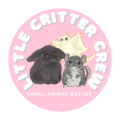About
Lifespan – 2.5-3.5 Years
Rats can live in same-sex trios and must not live alone as they are extremely social.
Rats are crepuscular, meaning they are most active at dawn and dusk.
To be ready for Rats you will need









- Large enclosure
- Mazuri rat blocks or oxbow rat blocks
- Food Dish(es)
- Glass Water Bottle – Rats can chew up plastic bottles.
- Hides, Hammocks & Toys – there are Etsy stores with safe options.
- Chews – wooden chews to help wear down their teeth
- Bedding – Aspen, Hemp, Sanichips, and Eco Bedding (Fiber core) and Back 2 Nature litter pellets
- Hard-sided Travel Carrier
- Small shop vac for cleaning up after your Rats -optional but useful
*Please understand that some items will need to be replenished monthly.
Enclosures
Rats are curious, which means they become bored easily. Providing a large cage in addition to a lot of enrichment is essential to keep your rat happy. Cages with a solid bottom instead of wire are safer for ratty feet.
We recommend Critter Nation (1/2” bar spacing). Please note that some rats can squeeze out of the Ferret Nation. We do not recommend wrapping cages in mesh, it can be time-consuming, and painful (watch those sharp spots).
Rat Care
Feeding – Most food bought at pet stores is not suitable for rats because they contain corn, seed mixes that are too fatty, and alfalfa pellets that they can’t digest. Your rats should get fresh foods and a pellet/block diet. Safe fruit/veggies list here. A harmful food list can be found here.
We recommend 12-15 grams per rat, scattered once a day. We do not allow bowl feeding / free feeding as this promotes obesity. We highly recommend the Shunamite Diet.
Chews – rats’ teeth grow throughout their lives and should be orange (this means they are healthy) so having access to chews and other toys will help them keep their teeth properly worn.
Bedding – Aspen, hemp, Sanichips, or Eco Bedding for digging and tunneling. Paper Pellets like Back 2 nature will help soak up urine and assist in litter training your rats. Bedding containing pine (non-kiln dried) and cedar are not recommended as they can cause respiratory inflammation.
Cleaning the Enclosure
You should spot-clean the cage every day. Dirty bedding, rotten food, feces, and urine should be removed daily. Rats need an environment that is as clean as possible to prevent respiratory disease and other illnesses.
Health
Rats will need regular vet visits just like any other pet. Rats are very prone to respiratory disease and tumors. We also highly recommend you get your rats spayed/ neutered. Spaying female rats as early as possible prevents Pyometra, and significantly reduces mammary tumors.
Neutering males helps with hormonal aggression and allows a mixed-gender group. We do not recommend sterile castration. Rats have susceptible respiratory systems. For this reason, air fresheners, candles, and wax melts should not be used. We recommend having a savings account for vet emergencies or setting up a Care Credit account that will allow you to pay the bill in increments over a year.
Traveling
Your rats will need a carrier for trips to the veterinarian and when they come home with you. Moves can be stressful so include some bedding or a hammock for them to hide in to keep comfortable. If traveling further a larger carrier may be needed so your rats have food and water.
Socializing & Bonding
Build trust with your rats by letting them smell your hand, offering treats, and talking to them. Playpens are great for socializing and mental stimulation out of the cage. They also allow you to have the rats closer to the ground so there is no risk of them being dropped or jumping out of your hands. A fall from your hands can mean broken bones and internal injuries.
Rats need to be kept in a minimum group size of 3. This promotes hierarchy, confidence, and feeling safe as well. If one passes one is never left alone.
How to pick up your rat
It is best not to pick them up until they are comfortable with you touching them. You can do so by cupping your hands underneath them or letting them crawl onto your hand. Do not pick them up from above. Doing so may frighten them as they are prey species. Try speaking to them before you pick them up so they know you are there.
Holding your rat
Holding your rat is best held close to your body without squeezing. Please be sure you are sitting on the ground when holding them to prevent accidental falls. After a while, you may find your rat likes hiding in your clothing such as your hoodie.
Out of Cage Time
Playpens are great for socializing and mental stimulation out of the cage. They also allow you to have the rats closer to the ground so there is no risk of them being dropped or jumping out of your hands. A fall from your hands can mean broken bones and internal injuries.
We DO NOT recommend the following:
- Small Enclosures, or aquariums
- Plastic (hamster type) exercise balls aka death balls.
- Inappropriately sized wheels (under 16”), or wheels made of barred, mesh, or wire wheels
- Poor Quality Foods that contain corn, seed mixes that are too fatty, and alfalfa pellets that they can’t digest.
- Cedar, Softwood, unknown woods.
- Cotton or fibrous bedding
- Snak Shaks or logs
Updated 7/31/2024
